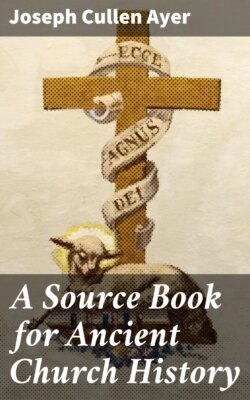Читать книгу A Source Book for Ancient Church History - Joseph Cullen Ayer - Страница 136
На сайте Литреса книга снята с продажи.
(b) Athenagoras, Supplicatio, 10, 12. (MSG, 6:910, 914.)
ОглавлениеAthenagoras, one of the ablest of the apologists, was, like Justin Martyr and several others, a philosopher before he became a Christian. His apology, known as Supplicatio, or Legatio pro Christianis, is his most important work. Its date is probably 177, as it is addressed to the Emperors Marcus Aurelius and Commodus.
Ch. 10. If it occurs to you to inquire what is meant by the Son, I will briefly state that He is the first product of the Father, not as having been brought into existence (for from the beginning God, who is the eternal mind [Nous], had the Logos in Himself, being eternally reasonable [λογικός]), but inasmuch as He came forth to be idea and energizing power of all material things, which lay like a nature without attributes, and an inactive earth, the grosser particles being mixed up with the lighter. The prophetic Spirit also agrees with our statements: “The Lord, it says, created me the beginning of His ways to His works.” The Holy Spirit himself, also, which operates in the prophets we say is an effluence of God, flowing from Him and returning back again as a beam of the sun.
Ch. 12. Are, then, those who consider life to be this, “Let us eat and drink, for to-morrow we die” [cf. I Cor. 15:32], and who regard death as a deep sleep and forgetfulness [cf. Hom., Iliad, XVI. 672], to be regarded as living piously? [pg 134] But men who reckon the present life as of very small worth indeed, and are led by this one thing along—that they know God and with Him His Logos, what is the oneness of the Son with the Father, what the communion of the Father with the Son, what is the Spirit, and what is the unity of these and their distinction, the Spirit, the Son, and the Father—and who know that the life for which we look is far better than can be described in word, provided we arrive at it pure from all wrong-doing, and who, moreover, carry our benevolence to such an extent that we not only love our friends … shall we, I say, when such we are and when we thus live that we may escape condemnation, not be regarded as living piously?
